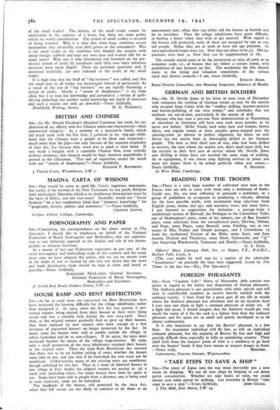HOUSE RAMP AND RENT RESTRICTION
SIR.—As far as rural areas are concerned the Rent Restriction Acts have increased the housing difficulty for the village inhabitants rather than mitigated it. In 1914, when the first Act was passed, it pre- vented tenants being ejected from their houses or their rents being raised and was a valuable help during the war 1914-1918. Since then, as the original tenants gradually died or gave up their houses, they were replaced by new tenants who were (except in a few instances of registered houses) no longer protected by the Act. In many cases the houses were sold to people outside the village, in others furnished and let to non-villagers. If let again, the rents were increased beyond the means of the village wage-earners. By 1939, only a small proportion of the 1914 inhabitants retained their houses at the original rents. Then the 1939 Rent Restriction Act enacted that there was to be no further raising of rents, whether the houses were relet or not, and also that if let furnished the rent must not be exorbitant. Unfortunately many of the existing rents are exorbitant, though stabilised by this Act. Thus in a street of identical houses in one village in East Anglia the original tenants are paying as. 3d. a week rent (including rates), but many houses have been let again at ros. Some have been sold to people from a distance, one is being used to store furniture, some are let furnished.
The landlords of the houses, still protected by the 1914 Act, when they fall vacant are not likely to continue to let them at an uneconomic rent, when they can either sell the houses or furnish and let to outsiders. Thus the village inhabitants have great difficulty in finding a house when they wish to get married. With regard to the houses still protected, most of these are occupied by one or two old people. Either they are at work or have old age pensions. In 19t3 agricultural wages were 15s. Now they are about to be £3. Old age pensions were then 5s. Now they can be supplemented to 18s.
The remedy would seem to be the permission to raise all rents to an economic scale, i.e., of houses that are below a' certain rental, with prohibition of any increase on this. The machinery for this already exists in the rating and valuation committees of the various rural and district councils.—I am, yours faithfully.
EVELYN ADAM.
Rural District Councillor, late Housing Inspector, Ministry of Health.






















 Previous page
Previous page